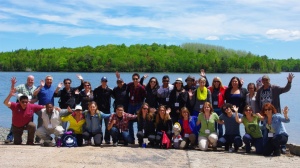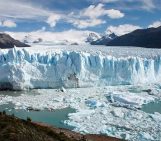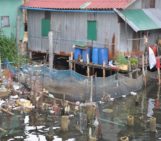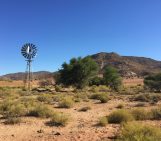[part six of a special six-part blog series by Mark Ranjram, MEng student at McGill University. From June 8 to June 13 2014, Mark had the privilege of being a part of the Canadian Water Network’s (CWN) Student and Young Professionals (SYP) Workshop in Cape Breton Island, Nova Scotia. Here is the prologue to this series.]
The fifth and final day of the workshop started off with a tour of the Sydney Tar Ponds. The tar ponds are a massive contaminated site originating from the production of coke (a derivative of coal), a popular fuel used by the steel plants in Cape Breton to heat their furnaces. A large remediation effort is being conducted at the tar ponds, with 700,000 metric tonnes of contaminated sediment being trapped over a 31 hectare area.
From the tar ponds, we went on a walking tour of a neighbourhood in Sydney immediately adjacent to the now defunct steel manufacturing plant. Our tour guide gave us the history of the neighbourhood, explaining the deeply discriminatory, destitute conditions the workers lived and worked in; similar in many ways to the plight of the coal miners which we explored in Day 3. One of the most haunting things our tour guide showed us was the tunnels which acted as gates into the steel plant compound. As workers walked through these gates, we were told to imagine the blast of heat and dust they would experience as their long day at the plants began. The tour was yet another remarkable realization of the true difficulty people face in their lives, and the amazing ability for the islanders of Cape Breton to overcome these challenges and maintain an optimistic, innovative perspective.
The day ended with a “kitchen party” at a local restaurant, where we sat at a long table and closed off our week in style. At the end of the night, we completed a final talking circle where we talked about what we gained from the workshop and how we aimed to pay it forward. Again, the circle was emotional, vulnerable, hilarious, and heartwarming. As we went around the circle I was again taken aback by how terrific the entire group was and what great things we could achieve with our entire careers ahead of us; and what could be accomplished by all the other people that weren’t there but have that same fire and that same genuine commitment to making the world even just a hair better than it was when they got here. I made a pledge at that table to find a way to bring some environmental education to my community, for example, helping people in my community understand where their water comes from, where it goes, what climate change is and its consequences, and other things in that vein. If I can bring even a modicum of environmental baseline knowledge to the people in my neighbourhood, I will have made a small contribution towards helping create a sustainability-knowledgeable citizen base and voting public. I’m not sure how I will accomplish what I want to accomplish, but the first nations and non-indigenous people of Cape Breton, our amazing workshop leaders, and the nineteen young researchers and professionals I met at the workshop will forever motivate me to make a positive mark on the world. There is a rising tide in the coming generations of water leaders, and I certainly refuse to be left behind as all these brilliant, committed people spend their time making a difference! Thank you again to everyone involved in the workshop, and thanks to all the people out there who want to see a sustainable world and believe it is possible in spite of all the great challenges we face today on Earth socially, politically, economically, and environmentally.







Pingback: The home of our hearts day 4: the water-energy nexus & deep thoughts on salty water | Water Underground